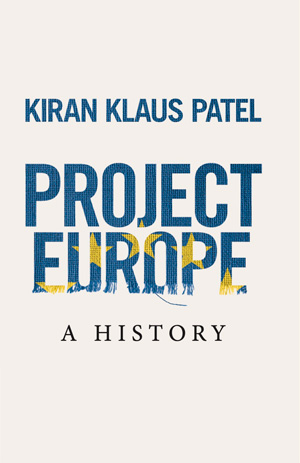
Project Europe offers a radically different interpretation of the European Union’s history. It shifts the focus away from the motives and driving forces of European integration to the concrete effects and results for the lives of people in the member states and beyond. In doing so, it challenges and deconstructs the myths surrounding the establishment and evolution of the European Community (EC) as the predecessors of today’s EU. Project Europe also assesses the various forms of criticism the EU frequently finds itself confronted with. The book covers the period from the first institutional attempts to build Europe in the second half of the 1940s until the end of the Cold War. It also discusses the lessons we can learn from this past for debates about the EU today.
In order to understand today’s EU, we need to revisit its history. Project Europe explains why a rather narrow organization that initially comprised just six Western European states is today so frequently equated with Europe as a whole. There was no single blueprint behind this process, but a complex web of different and often contradictory trends. European integration has fundamentally changed over the course of its history, and its undeniable importance today would have appeared improbable just a few decades ago. Many of the aspects we project back onto the early years in fact only took shape much more recently. Particularly the period of turmoil during the 1970s and 1980s helped to promote the European Community into the central European project. Incrementally, a new institutional reality arose, that subsequently also transformed the political systems of its member states.
The EC was born with a focus on economic integration, and to this day, the EU cannot deny its economic DNA. This business-centered capitalist logic was one of the main reasons why the EC were able to become the dominant forum of international cooperation in Europe at the time. Seeing the world through an economic lens decisively shaped the EC and continues to do so today—for better and worse.
That said, the effects of European integration on people’s lives remained mostly indirect and rather limited until the 1990s and 2000s. This explains why the relationship between citizens and the EC was often brittle. The results of European integration only became fully evident decades later, and this gap between decisions and effects explains many of the challenges and crises the EU has to deal with in our own times.
The book’s eight chapters address the key dimensions associated with the history of the European Enion. Did the predecessors of today’s EU really create peace after the Second World War, as is often suggested? How about their contribution to producing prosperity? What was the role of citizens in this process, and can the EU justifiably claim to be a ‘community of values?’
The book brings together many of the threads of the history of European cooperation and integration that I have worked on over the past decades and develops them further. It is not a mere synthesis of my earlier work but based on fresh research on a series of topics that were new for me, taking me to more than a dozen archives in several countries.
Methodologically, the book frees itself, firstly, from excessive concentration on motives and driving forces and instead focuses on concrete effects and results. About the latter, we know astonishingly little so far, echoing the way the EU in general has remained very abstract and intangible for most people.
Secondly, the book refrains from revisiting every step towards integration in a chronological way—such an approach easily creates a teleological narrative where deepening and expansion are the only modes of history, interrupted by occasional phases of standstill that are overcome by heroic efforts. Instead, it opts for a problem-oriented approach that allows us to ask fresh questions and to challenge standard narratives that have shaped academic and public debates over the past decades.
Thirdly, the book puts the history of the EU in a broader context, most importantly that of other forms of cooperation and integration in postwar Western Europe. Normally, the EU is seen as the main alternative to national sovereignty. Most existing studies also assume that the EU’s predecessors were fundamentally different to other forms of international cooperation. It is true that the EU today occupies a special status unavailable to organizations like the Council of Europe or the OECD. But that was not always the case. Hence, I also discuss how the EC was ultimately able to achieve precedence over other international organizations in Western Europe—and went on to rise out of that sphere altogether.
By studying the history of the European Union, the book argues that the current crises are not as unique as we might think. Even Brexit is not as singular and unique as often thought. In fact, Algeria left the EC in 1962, Greenland in 1985. Long before the 2016 referendum in the United Kingdom and Brexit that followed in 2020, European integration turned out to be a potentially reversible process, despite the talk about an ‘ever closer union.’
Admittedly, Greenland and Algeria had not joined the EC as sovereign states, but within the context of European colonialism. Their conditions differed significantly from Brexit or the occasionally discussed Grexit. Still, the processes in which they left the EC holds important lessons for today.
Both cases reveal that leaving the EC or the EU was never easy and that the search for national sovereignty often turned out to be disappointing. Algeria moved from a super-soft to a super-hard and from there to a softer constellation again. For several years in the 1960s, it retained a precarious special status, almost as if it was still part of the EC. Then, its privileged position crumbled, and European protectionism created insurmountable trade barriers with massive negative consequences for Algeria’s economy. From a low point in the 1970s, EU-Algeria relations slowly improved again. In contrast, Greenland’s exit was consistently soft and since then, relations have intensified further. The experience of Algeria and Greenland demonstrates that a new settlement will only be the basis for the next phase, and not the once-and-for-all, clear-cut solution that the exit camp likes to imagine.
Secondly, examining instances of withdrawal from the EU conveys an important message concerning the history of the European Union. Disintegration has always been part of the EU’s political normality; Brexit is not a fundamentally new challenge though many have thought and said that over the past years. Brexit only challenges the standard story about European integration with its logic of ‘ever closer union’, which is a powerful narrative the EU itself has forged and helped to disseminate.
Project Europe sheds new light on where the EU comes from, what it is and where its potentials might lie. It argues that it would be wrong to project the European Union’s undisputed contemporary status back into its early decades. In many respects the EU is a surprisingly young construct in which powers and processes are a good deal less entrenched than one might expect, given that its earliest predecessor organization was founded some seven decades ago. It has weathered many storms better than we tend to think. The crises the EU finds itself in today are therefore much less unusual than many have argued.
The European Union’s incremental growth in significance has made it both resilient and vulnerable. On the one side the EU is now responsible for truly important matters and enjoys perceptible influence. Additionally, diverse synergies arise when so many questions and policy areas are dealt with in a single institutional framework. The European Union has become astonishingly robust. This stems less from the idealism of the participants than the enormous inertia of established institutions, the diverse interests contained within them, and the general momentum of the integration process. At the same time, the EU of our time is not only systemically more relevant than ever before. Its rise to importance has also made it more vulnerable to fundamental crises, simply because it is now in charge of crucially important issues.
History teaches us how improbable and fragile our own times are; from the perspective of the past, the present was but one of many futures (and potentially an unlikely one). That is the case for the European Union too. Rather than proceeding as the implementation of a masterplan, the EU we have today appeared in fits and starts. Above all, the project set out to make the future more predictable. It is this hope that shines through all the treaties and directives, summits and compromises, plans and proposals. While many saw precisely that as a value in its own right, the model of European integration as an attempt to contain the future is less certain again today.
Nobody knows what the future will bring for the EU. But one thing is certain: It will depend not least on the conclusions Europeans and others derive from its history.


Kiran Klaus Patel holds the chair of European history at Ludwig Maximilian University Munich. He also serves as the founding director of Project House Europe, LMU’s center for interdisciplinary research on the history of contemporary Europe. Before joining LMU, he held professorships at Maastricht University (2011-2019) and the European University Institute in Florence, Italy (2007-2011), and an assistant professorship at Humboldt University in Berlin (2002-2007). He has also been a visiting professor (inter alia) at the Ecole des Hautes Etudes en Sciences Sociales in Paris, the London School of Economics, and Sciences Po in Paris.